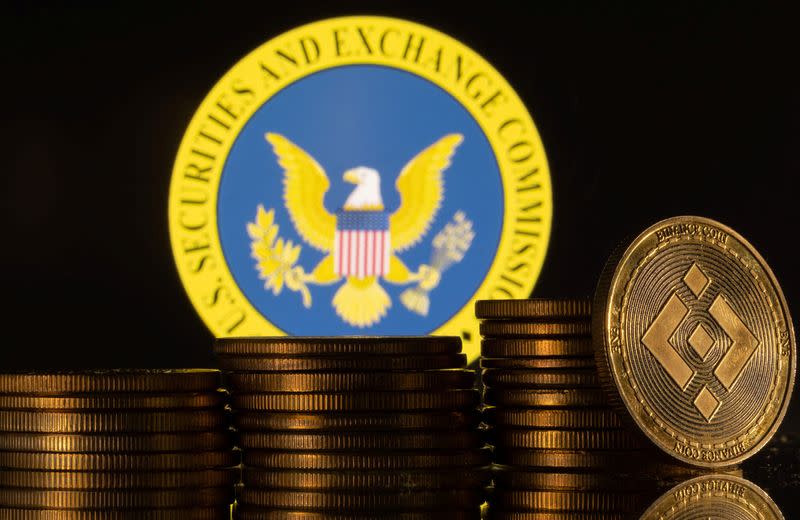More crypto exchanges operating in the US appear likely to be targeted after the Securities and Exchange Commission sued Coinbase and Binance this week.
With lawsuits filed against these two large crypto exchanges, for allegedly breaching SEC rules, other exchanges such as Kraken, Gemini, Crypto.com and OKCoin may be in their sights, analysts said.
The SEC on Tuesday alleged Coinbase traded at least 13 crypto assets that are securities that should have been registered, while on Monday it also accused Binance, the world’s largest cryptocurrency exchange, of offering 12 crypto coins without registering them as securities.
The lawsuits expand the overall number of cryptocurrencies that the SEC has explicitly identified as securities. That raises questions about other exchanges that have also allowed US investors to trade those tokens, and whether they could be at risk of SEC action, industry executives said.
ALSO SEE:
SEC Case Against Binance And Zhao Spurs $800m in Outflows
130 lawsuits and settlements so far
“All US exchanges should now be on notice that they may be subject to enforcement action if they permit, or have permitted, these tokens to be traded,” said Jason Allegrante, chief legal and compliance officer at Fireblocks, a digital asset infrastructure provider.
Both Coinbase and Binance deny the SEC’s allegations and have pledged to vigorously defend themselves in court. The SEC declined to comment.
While crypto companies started out in a regulatory grey area, the SEC under chair Gary Gensler has steadily asserted the agency’s jurisdiction over the industry, arguing most tokens meet the definition of a security and should be subject to the same strict disclosure rules.
The agency has brought more than 130 crypto lawsuits and settlements to date, according to data from consultancy Cornerstone Research and the SEC website, and in several of those cases has named specific tokens as securities.
The Coinbase and Binance suits this week expand that list to include some commonly traded tokens, such as Solana, Cardano and Polygon.
“We would not be surprised to see more lawsuits from the US regulators, and possibly the Department of Justice, in the next few weeks,” said Scott Freeman, co-founder of JST Digital, a financial services firm focusing on digital assets.
A spokesperson for the Justice Department declined to comment.
Legal cases could take years
Crypto companies, including Coinbase and Binance, dispute the SEC’s authority, saying many tokens are more akin to commodities, and have repeatedly called for regulators to create clear rules rather than assert their jurisdiction via enforcement actions.
“We do not list securities. For every asset we list, our teams conduct thorough risk and security evaluations which includes a comprehensive legal and compliance process. We will continue to closely monitor this case and others for precedential rulings,” a spokesperson for Kraken said.
Gemini, Crypto.com and OKCoin did not immediately respond to a request for comment.
The latest lawsuits will play out in court, which could take years. An SEC suit alleging Ripple’s XRP token is a security, for example, has been under litigation for more than two years.
But whether the SEC wins or loses, the suits send a strong signal to the industry that the agency is not going to let up, said executives.
While big crypto companies can afford to fight the SEC, smaller companies have filed for bankruptcy following SEC enforcement actions, including crypto exchange Beaxy.
“I don’t think that this SEC under this leadership necessarily cares whether they win or lose in the courts. I think what they are engaging in is a coordinated campaign to essentially destroy the crypto economy in the United States,” Stuart Alderoty, chief legal officer at Ripple, told the Piper Sandler Global Exchange & Fintech Conference in New York on Wednesday.
Gensler says shake-out good for investors
Speaking to CNBC on Tuesday, Gensler suggested an industry shake-out would be good for investors.
“I think if there’s a real value in these crypto tokens, then compliance will build trust and the business model might change,” he said.
According to analysts at Bernstein, roughly 90% of crypto trading already takes place outside the US Executives said they expected exchanges to continue to expand into international regions that have more favorable regulations.
Coinbase, for example, has previously said it would consider moving its global headquarters outside of the US.
“I would imagine that other firms spooked by the prevalent trend for regulation by enforcement will follow suit,” said Katharine Wooller, business unit director at Coincover, a provider of insurance for digital assets.
- Reuters with additional editing by Jim Pollard
ALSO SEE:
Global Watchdog Unveils Regulatory System For Crypto Sector
North Korea Hackers Stole Crypto Worth $721 Million From Japan
Hong Kong Banks on Lavish Parties to Woo China Crypto Firms























